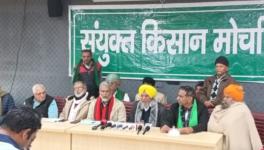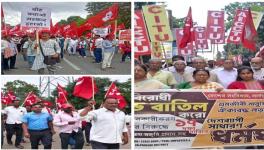Modi Government Taking Revenge from Farmers for Victorious Struggle Through Budget, says SKM
Coming down heavily on the Union Budget 2022–23, Sanyukta Kisan Morcha on Tuesday said that the Modi Government was punishing the country's farmers for leading the historic struggle against three central farm laws by slashing the allocation of agriculture and allied activities. The morcha emphasised that Union Finance Minister Nirmala Sitharaman did not mention about doubling of farmers’ income once as it failed to achieve the results.
It said, "After the unprecedented agitation of farmers over the past one and a half years, farmers of the country expected that a sensitive government would come up with specific effective measures in this budget to address their situation of not getting remunerative prices, facing crop losses due to natural calamities, and sinking deeper into debt. Instead, the government reduced the share of Agriculture and Allied Activities in the total budget from 4.3% last year to 3.8% this year, showing that it wants to punish the farmers for their successful movement.”
Darshan Pal, President of Krantikari Kisan Union and a member of the core committee of SKM, said that farmers were also waiting to hear the story about doubling their incomes, now that they were in 2022. After the Prime Minister declared in February 2016 that farmers’ incomes would be doubled within six years, every budget speech and speech on agriculture by the ruling party highlighted this promise. Now we have reached 2022, and there was not even a mention by the Finance Minister.
He said, "As per the government’s Doubling of Farmers’ Income report, the benchmark farm household income for 2015-16 was Rs 8,059, and this was promised to be doubled in real terms, taking inflation into account. This puts the Target income in 2022 at Rs 21,146. But, NSSO 77th Round shows that in 2018-19, the average farm household income was only Rs 10,218. Projecting at the growth rate of GVA in agriculture for next three years, the income in 2022 is still below Rs 12,000 per month, which is very far from the target of doubling the income.”
Pal said that the Centre is still to act on the promises made through the Union Agriculture Ministry at the end of agitation at the borders of the national capital. Among the promises, the centre had assured farmers about forming a committee with clear terms of reference on minimum support price, asking states to withdraw criminal cases registered during the agitation, compensating the kin of deceased farmers in movement, and addressing the concerns about Electricity Amendment Act.
Deciphering the provisions about the minimum support price in the budget, Pal said while the farmers are demanding MSP guarantee for all crops, the Budget speech mentioned only procurement for paddy and wheat from 1.63 crore farmers which form about 10% of all farmers in the country. Even in the case of paddy and wheat, the budget speech shows that the procurement fell in 2021-22 compared to 2020-21. While the Finance Minister proudly declared that the procurement of wheat and paddy in 2021-22 “will cover 1,208 lakh metric tonnes of wheat and paddy from 163 lakh farmers, and 2.37 lakh crore direct payment of MSP value to their accounts,” these figures are a serious reduction compared to 2020-21 when 1286 lakh metric tonnes were procured from 197 lakh farmers, and Rs 2.48 lakh crores were paid to the farmers. The number of benefited farmers in 2021-22 has fallen by 17%, and the quantity procured has decreased by 7% from 2020-21.”
Joginder Singh Ugrahan, President, Bharatiya Kisan Union Ekta Ugrahan emphasised that the centre was failing to commit legal guarantee for the minimum support price and slashed the allocation of schemes related to MSP through the finance ministry. In a written statement, he said that that PM-AASHA scheme (Pradhan Mantri Annadata Aay Sanrakshan Abhiyan) was brought with much fanfare in 2018 to implement the promise made by Finance Minister Arun Jaitley in the 2018 Budget speech that the government will ensure every farmer will get the declared MSP. “The allocation to this flagship scheme tells the story of the government’s commitment to MSP – it fell from Rs 1500 crore to Rs 500 crore to Rs 400 crore and this year to just Rs 1 crore.”
The veteran leader who leads one of the biggest farm unions of Punjab mentions that allocation for the Price Support Scheme-Market Intervention Scheme is Rs 1,500 crores this year, while the actual expenditure last year was Rs 3,596 crores. These amounts are paltry compared to anywhere between ₹50,000 to 75,000 crores which is the estimated shortfall between MSP and the actual price obtained by the farmers in the markets nationwide.”
Talking to NewsClick over the phone, Ashok Dhawale, National President, All India Kisan Sabha said that the centre failed to understand the human cost of crisis in the agricultural sector where more than 4 lakh farmers committed suicide due to ill driven policies. The current budget is rubbing the salt on their wounds by slashing the allocation of schemes that helped farmers, agriculture workers and women.
He said, "Allocations for MGNREGS have been reduced relative to the expenditures of the previous years, though the scheme has been very important for sustaining the rural economy and the rural poor during the past several years, including the Covid pandemic crisis. The actual expenditure in 2020-21 was Rs 1,11,169 crores, the revised estimate in 2021-22 was Rs 98,000 crores while the budget allocation for 2022-23 has been reduced to Rs 73,000 crores, whereas it should have been further strengthened."
He added that in most of the important schemes for farmers, the performance has been disappointing, and there is no sign of improvement. Many states have withdrawn from the flagship Pradhan Mantri Fasal Bima Yojana (PMFBY), including the PM's own state of Gujarat and many major states such as West Bengal, Telangana, Andhra Pradesh and Tamil Nadu. The PM-KISAN scheme was declared to begin with 12 crore farmers and expand coverage to 15 crore farmers.
He added that the irrigation schemes also seem to have been cut short even when it needs greater allocation. He said,” The PM-Krishi Sinchai Yojana had an allocation of Rs 4,000 crores in 2021-22 but had an expenditure of only Rs 2,000 crores. Now it has been subsumed under an expanded umbrella of RKVY. The RKVY scheme itself had an allocation of Rs 3,712 crore last year out of which only Rs 2,000 crores were spent.”
Get the latest reports & analysis with people's perspective on Protests, movements & deep analytical videos, discussions of the current affairs in your Telegram app. Subscribe to NewsClick's Telegram channel & get Real-Time updates on stories, as they get published on our website.
























